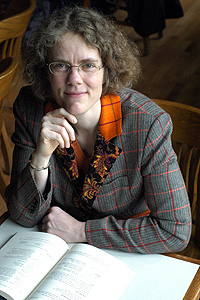Helma Dik, Associate Professor in Classics and the College
By Jennifer CarnigNews Office
 Helma Dik | |
Helma Dik once thought she would be a lawyer.
“I was a classics major and 95 percent of classics majors became teachers,” she said. “I thought I knew I didn’t want to be a teacher, so I started taking law classes so I’d have something to fall back on.”
Luckily, Dik reconsidered. It is impossible when talking to her now to imagine a day when teaching was not her passion. The Associate Professor in Classics and the College and Acting Chair of Classics, exudes excitement, and her students respond to it. It is why they nominated the scholar of ancient Greek language and literature for a Llewellyn John and Harriet Manchester Quantrell Award for Excellence in Undergraduate Teaching, an honor she calls “thrilling” and “one of the best things that has happened to me.
“I’m very, very happy about it,” she said. “Of course, with the kind of serious, motivated students we get here, it’s easy. It is a joy to be here with them.”
Dik’s enthusiasm is palpable. She feeds off of the intense, rapid-fire nature of the quarter system—even teaching the alphabet becomes “exhilarating” on such a tight schedule—and she loves seeing the look in a student’s eyes when something clicks and the lessons start making real sense.
Her goal, she said, is to teach her students more than just sentence structure. She wants them to think for themselves and question what they are learning.
Born and educated in Amsterdam, Dik began studying ancient Greek when she was 13. But it was not until she entered college and had a wonderful professor that she discovered that learning this language is more than memorization, repetition and looking up constructions in a grammar. Studying ancient Greek is about engagement with difficult questions and learning how to make your own critical judgments.
“It’s counterintuitive because here is this language that people have been reading for thousands of years, but there really is so much to figure out and so much to contribute,” Dik said. “That’s what hooked me—when our professor in first semester Greek showed us that and expected that we would contribute to these discussions. That’s what I try to do with my own students.”
The author of Word Order in Ancient Greek and numerous articles on the functional grammar of Greek, Dik compares teaching Beginning Greek to visiting a city such as Rome or Paris.
“Suppose you’ve been there dozens of times and you know it well, but you’re there with someone who hasn’t ever been there before,” she said. “With every turn of a corner you introduce something new to them and you watch them light up, and so that makes it new to you, too. It makes it magical.”
Always in search of a way to make the material more accessible to her students, Dik plans to be on leave next academic year to work on a Web-based Greek grammatical reference. The problem with grammar textbooks, she said, is that they are either too short and dumbed-down or too long and intimidating. With an online version students can choose to see the concise information, or if they’re interested, with a click they can read about why the rule is problematic and all of the recent work done on it.
“They can see why it’s a living field of inquiry, and maybe they’ll want to contribute to it,” she said.
Dik earned her doctorandus in 1989 and her doctorate in 1995, both from the University of Amsterdam. She joined the Chicago faculty in 1997. Her research focuses on Greek language and literature, having written her dissertation on word order variation in Herodotus. Dik incorporates insights from general linguistics and literary theory into her work.
![[Chronicle]](/images/sidebar_header_oct06.gif)